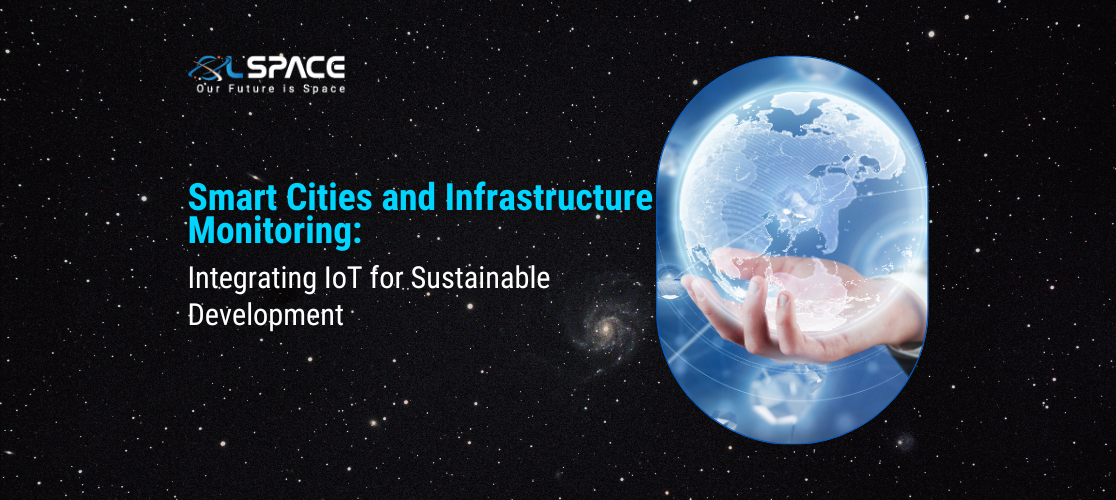02 April 2024
Smart Cities and Infrastructure Monitoring: Integrating IoT for Sustainable Development

The concept of smart cities encompasses the integration of technology to enhance the efficiency, sustainability, and quality of urban living. A key aspect of smart city development is infrastructure monitoring, where the Internet of Things (IoT) plays a pivotal role. This article explores the intersection of smart cities, infrastructure monitoring, and IoT technologies, focusing on how IoT integration contributes to sustainable development and improved urban infrastructure management.
1. IoT in Infrastructure Monitoring:
IoT involves interconnected devices, sensors, and systems that collect and exchange data over the internet. In infrastructure monitoring, IoT-enabled sensors are deployed across various assets such as buildings, roads, bridges, utilities, and public spaces to gather real-time data on performance, condition, and usage patterns.
2. Real-Time Data Collection and Analysis:
IoT sensors continuously monitor parameters such as structural health, environmental conditions, traffic flow, energy consumption, water usage, and waste management. The data collected is transmitted in real time to centralised platforms where it is analysed to derive insights, detect anomalies, and facilitate proactive maintenance and management strategies.
3. Enhanced Asset Management:
IoT-enabled asset management systems provide a holistic view of infrastructure assets, their health status, maintenance needs, and lifecycle stages. By leveraging predictive analytics and machine learning algorithms, cities can optimise asset utilisation, prolong asset lifespan, and prioritise maintenance activities based on data-driven insights.
4. Smart Energy and Resource Management:
IoT solutions enable smart energy and resource management in cities by monitoring energy consumption, identifying energy inefficiencies, and implementing demand-responsive systems. Smart grids, intelligent lighting, water management systems, and waste monitoring platforms contribute to resource conservation, cost savings, and environmental sustainability.
5. Traffic and Transportation Optimisation:
IoT sensors deployed in transportation infrastructure, such as traffic lights, parking lots, and public transit systems, help in managing traffic flow, reducing congestion, and improving safety. Real-time data analytics enable dynamic traffic routing, predictive maintenance for vehicles, and integration with smart mobility solutions for efficient urban transportation.
6. Environmental Monitoring and Sustainability:
IoT devices support environmental monitoring initiatives by measuring air quality, noise levels, pollution levels, and weather conditions. Cities can implement early warning systems for natural disasters, pollution alerts, and climate change mitigation strategies based on data-driven insights gathered from IoT-enabled environmental sensors.
7. Citizen Engagement and Quality of Life:
IoT technologies enhance citizen engagement through smart city applications, mobile apps, and interactive platforms that provide real-time information, feedback mechanisms, and participatory governance opportunities. Improved public services, optimised infrastructure, and enhanced safety contribute to a better quality of life for residents.
8. Data Security and Privacy Considerations:
While IoT offers numerous benefits, cities must address data security, privacy concerns, and cybersecurity risks associated with interconnected devices and data transmission. Robust data encryption, access controls, compliance with data protection regulations, and cybersecurity protocols are essential for ensuring the integrity and confidentiality of IoT-generated data.
Conclusion:
Integrating IoT into smart cities and infrastructure monitoring is a transformative approach that fosters sustainable development, operational efficiency, and resilience in urban environments. By harnessing real-time data insights, optimising resource utilisation, enhancing asset management practices, and promoting citizen-centric solutions, cities can address complex urban challenges while promoting environmental sustainability, economic growth, and improved quality of life for residents. The continued evolution of IoT technologies, coupled with effective governance frameworks and public-private partnerships, will drive the ongoing advancement of smart cities and contribute to building smarter, greener, and more livable urban spaces for the future.
